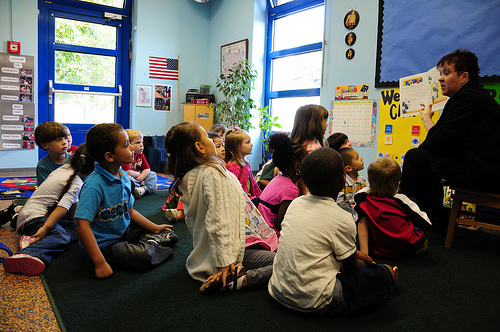Carol’s Summary:
A recent poll by Emily Hall Tremaine Foundation questioned 1,000 members of the public, parents, teachers and school administrators on pre-K students and learning disabilities. The results were contradictory. More than two-thirds of parents think specific signs of learning disabilities, like the inability to hold a pencil, rhyme words and make friends, are something their 2-4 year old will grow-out of, and therefore don’t seek early intervention. However, 78 % of those polled are aware that early intervention for learning disabilities is important. Most also believed children with disabilities have normal or above normal intelligence – but 80 % wrongly associated disabilities with mental retardation and autism.
Learning disabilities are neurological disorders not a cognitive impairment. This means the student’s disability is in how they process information not their capacity to learn information. Early intervention is important because, once recognized, a learning disability can be managed and halted so it does not follow a student to elementary and beyond. New initiatives are emphasizing the importance of early intervention and requesting to use Response to Intervention (RTI), an approach used in primary and secondary grades, in pre-k programs. The concerns surrounding the RTI approach in pre-K are: teachers will have the responsibility of diagnosing students with disabilities and may not have the expertise to effectively do so; money will be going toward this not-yet certain approach and away from current programs; and RTI needs to undergo more research before it is used as a tool to diagnose students.
Even so, this poll shows most parents are unaware of what a learning disability is and are in denial about the possibility of their child having one. Parental fear and the teacher’s inability to diagnose is causing a dangerous pause in a child’s early education. Early intervention brings the possibility of discovering a child’s unique learning ability before it’s defined as a feared learningdisability.
LifeBound encourages students to discover how they are unique in GIFTS AND TALENTS for teenagers. This book can help middle school kids identify their unique strengths whether it is baking cakes, digging ditches or conducting research.
Article: Identifying and Addressing Learning Disabilities in Preschoolers
More than two-thirds of parents think specific signs of learning disabilities* are something a 2-to-4 year-old will “grow out of†and are therefore more likely to delay seeking professional help, according to poll results released this week. At the same time, 78 percent of respondents recognize that early intervention is important.
Read the full article at: earlyed.newamerica.net










